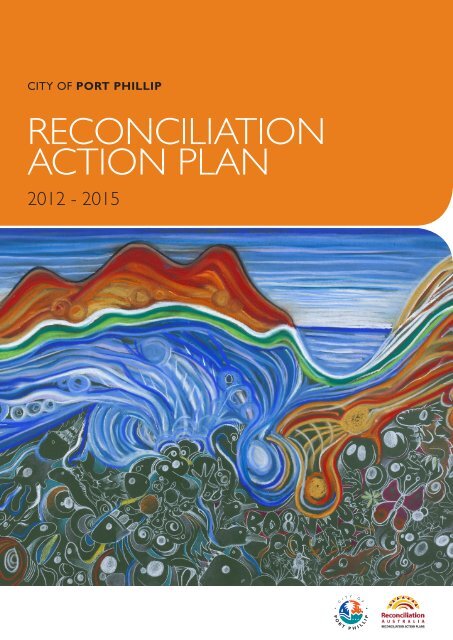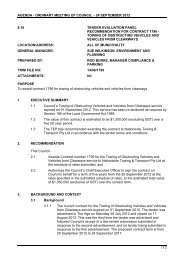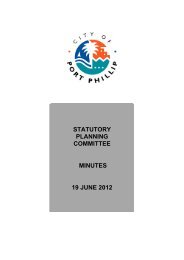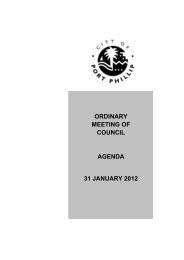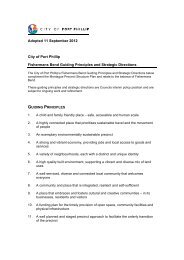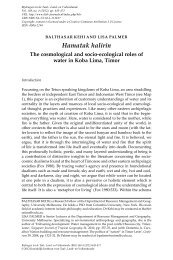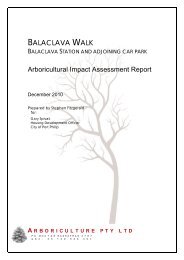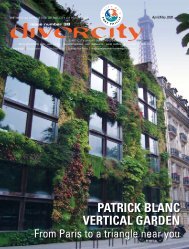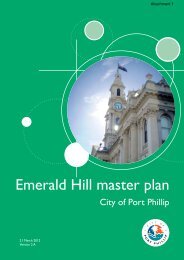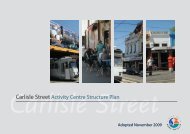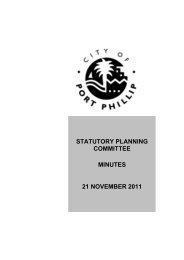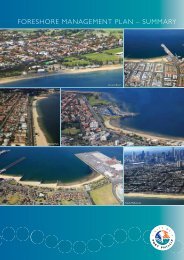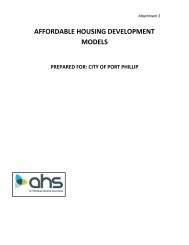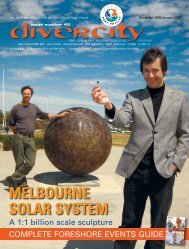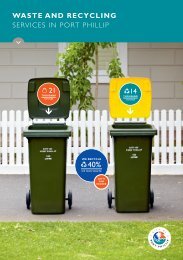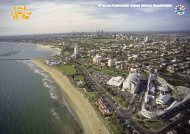Reconciliation Action Plan (2012-2015) - City of Port Phillip
Reconciliation Action Plan (2012-2015) - City of Port Phillip
Reconciliation Action Plan (2012-2015) - City of Port Phillip
Create successful ePaper yourself
Turn your PDF publications into a flip-book with our unique Google optimized e-Paper software.
CITY OF PORT PHILLIP<br />
RECONCILIATION<br />
ACTION PLAN<br />
<strong>2012</strong> - <strong>2015</strong>
CONTENTS<br />
MAYOR’S FOREWORD..................................................................................................................... 4<br />
STATEMENT OF COMMITMENT............................................................................................... 6<br />
OUR VISION FOR RECONCILIATION.................................................................................... 7<br />
OUR RESPONSIBILITIES.................................................................................................................... 8<br />
OUR RECONCILIATION ACTION PLAN JOURNEY..................................................11<br />
1. RELATIONSHIPS..............................................................................................................................12<br />
Artwork name: ‘Boon Wurrung Country: Connection<br />
to Terrestrial and Marine Landscapes’ by Adam Edwards<br />
Magennis (<strong>2012</strong>).<br />
Medium: Pastel and Chinagraph on board<br />
Brief: Terrestrial and marine environments are<br />
connected by an organic fusion functioning in tandem<br />
to produce what we know as the natural landscape.<br />
Within this landscape, Boon Wurrung people raised<br />
their families and above all else, owned a developed<br />
system for socio-cultural organisation.<br />
2. RESPECT...............................................................................................................................................15<br />
3. OPPORTUNITIES............................................................................................................................18<br />
4. TRACKING PROGRESS AND REPORTING...................................................................20<br />
ACKNOWLEDGEMENTS...............................................................................................................23<br />
This is identified as the cultural landscape <strong>of</strong> Boon<br />
Wurrung country. The cross section snapshot is from the<br />
eastern flank <strong>of</strong> this waterway, heading from St Kilda to<br />
Dromana. Integrated into this cross section <strong>of</strong> country<br />
is the organic collective <strong>of</strong> fauna that inhabit the country.<br />
This artwork represents sustainability in that the natural<br />
order was not harmed or negatively impacted. It is<br />
important to protect and preserve these cross sections<br />
<strong>of</strong> country in order to understand the true nature and<br />
identity <strong>of</strong> the place.
MAYOR’S<br />
FOREWORD<br />
I am very proud to present the inaugural<br />
<strong>City</strong> <strong>of</strong> <strong>Port</strong> <strong>Phillip</strong> <strong>Reconciliation</strong> <strong>Action</strong><br />
<strong>Plan</strong> (<strong>2012</strong>-<strong>2015</strong>). This is the Council’s<br />
guiding policy document on Aboriginal<br />
and Torres Strait Islander issues which has<br />
been developed in consultation with the<br />
Aboriginal and Torres Strait Islander citizens<br />
<strong>of</strong> the area, the <strong>Port</strong> <strong>Phillip</strong> Citizens for<br />
<strong>Reconciliation</strong>, and the broader community.<br />
The plan seeks to realise Council’s vision<br />
for strengthening its diverse and inclusive<br />
community.<br />
We are committed to delivering the <strong>City</strong><br />
<strong>of</strong> <strong>Port</strong> <strong>Phillip</strong> <strong>Reconciliation</strong> <strong>Action</strong> <strong>Plan</strong><br />
and working with the community and other<br />
stakeholders towards reconciliation.<br />
The <strong>City</strong> <strong>of</strong> <strong>Port</strong> <strong>Phillip</strong> respectfully<br />
acknowledges the Yalukit Wilam Clan <strong>of</strong><br />
the Boon Wurrung. We pay our respect<br />
to their Elders, both past and present.<br />
We acknowledge and uphold their<br />
continuing relationship to this land.<br />
The <strong>City</strong> <strong>of</strong> <strong>Port</strong> <strong>Phillip</strong> has a long history <strong>of</strong><br />
acknowledging the dispossession suffered by<br />
Aborigines and Torres Strait Islanders and in<br />
1997 it was one <strong>of</strong> the first local government<br />
areas in Australia to <strong>of</strong>fer an apology to<br />
members <strong>of</strong> the Stolen Generation for pain<br />
and loss suffered from the child removal<br />
policies <strong>of</strong> various governments.<br />
We respect the contribution <strong>of</strong> Aboriginal<br />
peoples and Torres Strait Islanders to<br />
Australian society.<br />
We celebrate the exploits <strong>of</strong> the First<br />
Australians on the sporting field, in the<br />
boardroom, in the classroom, and in the<br />
political arena.<br />
We stand in awe at some <strong>of</strong> the oldest<br />
representations <strong>of</strong> human activity on this<br />
planet through age-old rock art.<br />
We are moved by the sound <strong>of</strong> ancient<br />
languages being spoken, and dance ceremonies<br />
passed down generation by generation.<br />
We want the Aboriginal and Torres Strait<br />
Islander residents <strong>of</strong> <strong>Port</strong> <strong>Phillip</strong> to be made to<br />
feel welcome in a culturally safe environment.<br />
Council is committed to contributing to a<br />
national reconciliation movement, and the<br />
national campaign to ‘close the gap’ in relation<br />
to the life expectancy gap between Aboriginal<br />
and Torres Strait Islander peoples and the rest<br />
<strong>of</strong> Australia.<br />
The <strong>Reconciliation</strong> <strong>Action</strong> <strong>Plan</strong> will focus on<br />
good relationships, respecting the special<br />
contribution <strong>of</strong> Aboriginal and Torres Strait<br />
Islander peoples to Australia, and working<br />
together to ensure they have the same life<br />
opportunities as other Australians.<br />
The <strong>City</strong> <strong>of</strong> <strong>Port</strong> <strong>Phillip</strong> <strong>Reconciliation</strong> <strong>Action</strong><br />
<strong>Plan</strong> <strong>2012</strong>-<strong>2015</strong> provides Council with an<br />
opportunity to work for true reconciliation.<br />
Cr Rachel Powning<br />
Mayor<br />
<strong>City</strong> <strong>of</strong> <strong>Port</strong> <strong>Phillip</strong><br />
On behalf <strong>of</strong> the Yalukit Wilam clan <strong>of</strong> the<br />
Boon Wurrung, the First Peoples <strong>of</strong> the<br />
municipality now known as the <strong>City</strong> <strong>of</strong> <strong>Port</strong><br />
<strong>Phillip</strong>, it gives me great pleasure to endorse<br />
the <strong>City</strong> <strong>of</strong> <strong>Port</strong> <strong>Phillip</strong>’s first <strong>Reconciliation</strong><br />
<strong>Action</strong> <strong>Plan</strong>.<br />
We, as the Yalukit Wilam people <strong>of</strong> the<br />
Boon Wurrung, feel very proud to have<br />
been involved in this <strong>Plan</strong>’s development.<br />
In conjunction with other local Aboriginal<br />
and Torres Strait Islander residents and in the<br />
true spirit <strong>of</strong> reconciliation, we very much look<br />
forward to working with the Council over the<br />
implementation phase.<br />
Carolyn Briggs<br />
Boon Wurrung Senior Elder<br />
Chairperson, Boon Wurrung Foundation<br />
National Female Elder <strong>of</strong> the Year<br />
NAIDOC 2011 (Pictured Above)<br />
<strong>Reconciliation</strong> Australia is pleased to welcome the<br />
<strong>City</strong> <strong>of</strong> <strong>Port</strong> <strong>Phillip</strong>’s first <strong>Reconciliation</strong> <strong>Action</strong> <strong>Plan</strong><br />
(RAP). RAPs are business plans that use a holistic<br />
approach to build meaningful relationships and<br />
create an environment <strong>of</strong> respect and recognition.<br />
By developing and implementing their RAP, the<br />
<strong>City</strong> <strong>of</strong> <strong>Port</strong> <strong>Phillip</strong> has joined a community <strong>of</strong><br />
organisations, large and small, that have committed<br />
to turning good intentions into real actions.<br />
This RAP is the next step in the Council’s<br />
commitment to make the <strong>City</strong> <strong>of</strong> <strong>Port</strong> <strong>Phillip</strong> a<br />
welcoming and culturally safe environment for<br />
Aboriginal and Torres Strait Islander peoples<br />
and other residents, and to working together to<br />
ensure the same life opportunities are available<br />
to all Australians.<br />
Their deep understanding <strong>of</strong> the need to build<br />
strong relationships in an environment that is<br />
appreciative <strong>of</strong> diversity is evident throughout<br />
their plan.<br />
<strong>Reconciliation</strong> Australia thanks the <strong>City</strong> <strong>of</strong> <strong>Port</strong><br />
<strong>Phillip</strong> for taking this important step in promoting<br />
reconciliation. On behalf <strong>of</strong> <strong>Reconciliation</strong><br />
Australia, I wish you well for the important<br />
actions you have set for the coming years.<br />
Leah Armstrong<br />
Chief Executive Officer<br />
<strong>Reconciliation</strong> Australia<br />
4<br />
5
STATEMENT<br />
OF COMMITMENT<br />
OUR VISION<br />
FOR RECONCILIATION<br />
The Council <strong>of</strong> the <strong>City</strong> <strong>of</strong> <strong>Port</strong> <strong>Phillip</strong><br />
acknowledges that Aboriginal and Torres Strait<br />
Islander peoples were the first people <strong>of</strong> this<br />
land and have survived European settlement<br />
for more than two centuries.<br />
The <strong>City</strong> <strong>of</strong> <strong>Port</strong> <strong>Phillip</strong> values its diverse and<br />
multicultural community and encourages<br />
tolerance and respect for all.<br />
The arrival <strong>of</strong> Europeans brought massive<br />
change to the land and to its Aboriginal and<br />
Torres Strait Islander peoples. For its part, <strong>Port</strong><br />
<strong>Phillip</strong> <strong>City</strong> Council acknowledges and grieves<br />
for the loss by the Aboriginal and Torres Strait<br />
Islander peoples <strong>of</strong> their land, their children,<br />
their health and their lives.<br />
We acknowledge the right <strong>of</strong> Aboriginal and<br />
Torres Strait Islander peoples to live according<br />
to their own values and customs and we<br />
commit ourselves to respecting Aboriginal<br />
sacred sites and significant places.<br />
The Council recognises the valuable<br />
contribution to the <strong>Port</strong> <strong>Phillip</strong> region made<br />
by Aboriginal and Torres Strait Islander peoples<br />
and looks forward to a future <strong>of</strong> mutual respect<br />
and harmony.<br />
The Council supports the Aboriginal and Torres<br />
Strait Islander and non-Aboriginal and Torres<br />
Strait Islander peoples <strong>of</strong> Australia working<br />
together for the development <strong>of</strong> a formal<br />
instrument <strong>of</strong> reconciliation.<br />
The <strong>Reconciliation</strong> <strong>Action</strong> <strong>Plan</strong> (<strong>2012</strong>-<strong>2015</strong>)<br />
is our commitment to build on the existing<br />
working relationship the <strong>City</strong> <strong>of</strong> <strong>Port</strong> <strong>Phillip</strong><br />
has with the local Aboriginal and Torres Strait<br />
Islander community.<br />
Our vision is for a Council that supports<br />
citizens, business and community organisations<br />
in the <strong>Port</strong> <strong>Phillip</strong> area working together for the<br />
development <strong>of</strong> a <strong>Reconciliation</strong> <strong>Action</strong> <strong>Plan</strong>.<br />
Council promotes the need for consideration<br />
<strong>of</strong> the local Aboriginal and Torres Strait<br />
Islander community in all <strong>of</strong> Council’s planning<br />
and service delivery activities across physical,<br />
strategic, cultural, recreational and economic<br />
frameworks.<br />
Our vision is to actively advocate and lobby<br />
other levels <strong>of</strong> government and the community<br />
sector for the needs <strong>of</strong> the whole <strong>Port</strong> <strong>Phillip</strong><br />
community, with a special focus on sectors<br />
<strong>of</strong> the community, such as the Aboriginal<br />
and Torres Strait Islander community, who<br />
historically have had a limited voice to express<br />
their needs.<br />
Council is committed to social justice principles<br />
and acknowledges social and cultural differences<br />
that impact on an individual’s and community’s<br />
ability to share on an equitable basis the<br />
resources that provide basic human rights such<br />
as: food, shelter, material goods, education,<br />
health and wellbeing, and access to information.<br />
6<br />
7
OUR<br />
RESPONSIBILITIES<br />
The <strong>City</strong> <strong>of</strong> <strong>Port</strong> <strong>Phillip</strong> is located on the<br />
northern shore <strong>of</strong> <strong>Port</strong> <strong>Phillip</strong> Bay, south <strong>of</strong><br />
Melbourne city centre.<br />
The Council area is in the inner city <strong>of</strong><br />
Melbourne, located between 2 - 8kms<br />
south <strong>of</strong> the Central Business District.<br />
It has an estimated population <strong>of</strong> more<br />
than 97,000 people.<br />
The Council, one <strong>of</strong> 79 local councils in Victoria,<br />
is the local government authority for the<br />
suburbs <strong>of</strong> South Melbourne, <strong>Port</strong> Melbourne,<br />
Albert Park, Middle Park, East St Kilda, Balaclava,<br />
Ripponlea, Elwood, St Kilda and St Kilda West.<br />
The area, particularly St Kilda and Emerald Hill<br />
(South Melbourne) is historically a meeting<br />
place for sections <strong>of</strong> the Melbourne Aboriginal<br />
and Torres Strait Islander community, as well as<br />
visitors from interstate.<br />
The area also draws many Aboriginal and<br />
Torres Strait Islander artists who find the area<br />
conducive to successfully producing their work.<br />
As a local government body, the <strong>City</strong> <strong>of</strong> <strong>Port</strong><br />
<strong>Phillip</strong> provides for the peace, order and good<br />
government <strong>of</strong> the municipality. In 2010/11,<br />
Council had 938 staff (made up <strong>of</strong> 438 fulltime,<br />
305 part time and 151 casual staff).<br />
The Council administers various laws for its<br />
citizens such as land use planning, environment<br />
protections, public health, traffic, parking and<br />
animal management.<br />
The Council maintains community<br />
infrastructure such as roads, bridges, drains,<br />
town halls, libraries, recreation facilities, parks<br />
and gardens.<br />
The <strong>City</strong> <strong>of</strong> <strong>Port</strong> <strong>Phillip</strong> contains a large amount<br />
<strong>of</strong> foreshore area on <strong>Port</strong> <strong>Phillip</strong> Bay, and is<br />
a popular recreational destination, attracting<br />
approximately 8 million visitors each year.<br />
Proximity to the Melbourne CBD ensures<br />
that <strong>Port</strong> <strong>Phillip</strong> is an area in high demand.<br />
Historically, while many areas <strong>of</strong> the<br />
municipality have had a predominantly workingclass<br />
background, higher socio-economic<br />
groups now dominate, following decades <strong>of</strong><br />
gentrification. Low income earners now make<br />
up approximately 20% <strong>of</strong> households.<br />
The total identified Aboriginal and Torres Strait<br />
Islander population <strong>of</strong> <strong>Port</strong> <strong>Phillip</strong> is 236 people<br />
(2006 ABS Census), with many living in St Kilda,<br />
South Melbourne and <strong>Port</strong> Melbourne.<br />
The demographic <strong>of</strong> Aboriginal and Torres<br />
Strait Islander peoples reflects the wider<br />
makeup <strong>of</strong> <strong>Port</strong> <strong>Phillip</strong> which includes a mix<br />
<strong>of</strong> middle and low income residents.<br />
For several years, Council has had service<br />
agreements for Aboriginal and Torres Strait<br />
Islander community activities organised by<br />
Inner South Community Health Service,<br />
<strong>Port</strong> <strong>Phillip</strong> Citizens for <strong>Reconciliation</strong>,<br />
and the Boon Wurrung Foundation.<br />
In 1997, Council was one <strong>of</strong> the first local<br />
government areas in Australia to apologise<br />
to members <strong>of</strong> the Stolen Generations for<br />
the continuing impact <strong>of</strong> their loss.<br />
It has employed an Indigenous Arts Officer<br />
since the mid-1990s, and held the first<br />
Indigenous arts festival in <strong>Port</strong> <strong>Phillip</strong> in 2002.<br />
Council has also engaged with the local<br />
Aboriginal and Torres Strait Islander<br />
community through a series <strong>of</strong> Memoranda<br />
<strong>of</strong> Understanding (MOU) (1998), (2002),<br />
and (2008).<br />
In 2010, the Council employed an Indigenous<br />
Policy Officer to develop and implement its<br />
first <strong>Reconciliation</strong> <strong>Action</strong> <strong>Plan</strong>.<br />
The development and implementation <strong>of</strong><br />
the <strong>Reconciliation</strong> <strong>Action</strong> <strong>Plan</strong> (<strong>2012</strong>-<strong>2015</strong>)<br />
is guided by the <strong>City</strong> <strong>of</strong> <strong>Port</strong> <strong>Phillip</strong> Council<br />
<strong>Plan</strong> (2009-2013), the <strong>City</strong> <strong>of</strong> <strong>Port</strong> <strong>Phillip</strong><br />
Social Justice Charter (2011), the Victorian<br />
Charter <strong>of</strong> Human Rights and Responsibilities<br />
(2006), and the <strong>City</strong> <strong>of</strong> <strong>Port</strong> <strong>Phillip</strong> Health and<br />
Wellbeing <strong>Plan</strong> (2007-2013).<br />
Council also operates under frameworks<br />
created by the United Nations International<br />
Declaration on the Rights <strong>of</strong> Indigenous<br />
Peoples (2007), and <strong>Reconciliation</strong> Australia.<br />
8<br />
9
OUR<br />
RECONCILIATION<br />
ACTION PLAN<br />
JOURNEY<br />
Yalukit Wilam Ngargee: People Place Gathering Festival<br />
The Yalukit Wilam Ngargee (YWN) festival provides a platform for contemporary<br />
Aboriginal and Torres Strait Islander (ASTI) performers and artists to showcase<br />
their works to a diverse audience.<br />
Hosted by the <strong>City</strong> <strong>of</strong> <strong>Port</strong> <strong>Phillip</strong>, the YWN is the opening festival event <strong>of</strong> the<br />
world-renowned 9-day St Kilda Festival.<br />
The YWN attracts crowds between 7000 to 10,000 people whilst satellite programs<br />
throughout the week incorporate exhibitions, live performances and film screenings.<br />
Held in St Kilda’s O’Donnell Gardens, a significant contemporary Indigenous meeting<br />
place, the YWN showcases free to the general public emerging and established ATSI<br />
musicians, dancers and performers, market stall holders, and children’s activities.<br />
The YWN engages and trains local ATSI community members to marshal the main<br />
day and to assist in stage management.<br />
The YWN also incorporates a dance program which in recent years has featured<br />
a traditional Boon Wurrung ceremony being held which hadn’t been performed in<br />
over 150 years. The sunset ceremony, produced by Idja Indigenous Dance Company,<br />
involved over 60 Aboriginal dancers, and ended with large sections <strong>of</strong> the general<br />
public participating in the final dance.<br />
The <strong>City</strong> <strong>of</strong> <strong>Port</strong> <strong>Phillip</strong>’s ongoing commitment<br />
to the development <strong>of</strong> a reconciliation process<br />
at the local government level is reflected in the<br />
<strong>Reconciliation</strong> <strong>Action</strong> <strong>Plan</strong> <strong>2012</strong>-<strong>2015</strong>.<br />
In February 2011, Council endorsed the<br />
development <strong>of</strong> a <strong>Reconciliation</strong> <strong>Action</strong> <strong>Plan</strong><br />
(RAP) for the <strong>City</strong> <strong>of</strong> <strong>Port</strong> <strong>Phillip</strong>.<br />
The RAP will detail a set <strong>of</strong> actions that Council<br />
will undertake to achieve reconciliation across a<br />
range <strong>of</strong> departments.<br />
Progress against actions will be measured.<br />
<strong>Action</strong>s will be guided by issues identified by<br />
the local Aboriginal and Torres Strait Islander<br />
community.<br />
A RAP will give the organisation a framework<br />
for the future, detailing steps and priorities to<br />
achieve equality for Aborigines and Torres<br />
Strait Islanders.<br />
The process for developing a RAP was also<br />
endorsed by the Urban South Local Indigenous<br />
Network, Boon Wurrung Foundation, Inner<br />
South Community Health Service, Indigenous<br />
service providers, and the <strong>Port</strong> <strong>Phillip</strong> Citizens<br />
for <strong>Reconciliation</strong>.<br />
The RAP will be Council’s central policy<br />
document on working with the local Aboriginal<br />
and Torres Strait Islander community.<br />
As part <strong>of</strong> the development process, a <strong>City</strong> <strong>of</strong><br />
<strong>Port</strong> <strong>Phillip</strong> <strong>Reconciliation</strong> <strong>Action</strong> <strong>Plan</strong> Working<br />
Group has been established, made up <strong>of</strong><br />
<strong>City</strong> <strong>of</strong> <strong>Port</strong> <strong>Phillip</strong> staff and managers.<br />
The Working Group, at key stages <strong>of</strong><br />
development, will invite Aboriginal and Torres<br />
Strait Islander community leaders to meetings<br />
for endorsement and oversight.<br />
This group, which meets quarterly, will facilitate<br />
internal discussions over RAP development and<br />
its implementation within Council.<br />
This framework focuses on: good relationships;<br />
respecting the special contribution <strong>of</strong> Aboriginal<br />
and Torres Strait Islander peoples to Australia;<br />
and working together to ensure Aboriginal and<br />
Torres Strait Islander peoples have the same life<br />
opportunities as other Australians.<br />
The development and implementation <strong>of</strong> a RAP,<br />
is consistent with the Council <strong>Plan</strong> to continue<br />
to strengthen our relationship with Aboriginal<br />
and Torres Strait Islanders and actively support<br />
reconciliation (see section 3.1.8).<br />
The RAP will also explore employment<br />
opportunities for Aboriginal and Torres<br />
Strait Islander peoples; will work with local<br />
organisations to build awareness, support and<br />
understanding for Aboriginal and Torres Strait<br />
Islander culture; and enhance cultural and<br />
economic development for local Aboriginal<br />
and Torres Strait Islander peoples.<br />
10<br />
11
1. RELATIONSHIPS<br />
FOCUS AREAS<br />
Recognition/Negotiation/Commitment/Engagement<br />
ACTION RESPONSIBILITY TIMELINE MEASURABLE TARGET<br />
1. RAP Working Group established<br />
and made up <strong>of</strong> Aboriginal<br />
and Torres Strait Islanders<br />
and other staff members with<br />
executive support, to manage the<br />
implementation <strong>of</strong> the RAP<br />
Executive Management Team<br />
Community Development<br />
Short term: Working<br />
Group will meet<br />
quarterly and report<br />
annually.<br />
September <strong>2012</strong><br />
Four meetings per<br />
annum to monitor<br />
progress<br />
Since 1994, when the <strong>City</strong> <strong>of</strong> <strong>Port</strong> <strong>Phillip</strong> commissioned<br />
a report on the needs <strong>of</strong> its Aboriginal and Torres Strait<br />
Islander community, the Council has been committed to<br />
2. RAP Statement <strong>of</strong> Commitment is<br />
embedded into Council’s Aboriginal<br />
and Torres Strait Islanders policy<br />
framework following endorsement<br />
by Councillors.<br />
Executive Management Team<br />
Community Development<br />
Short term:<br />
March 2013<br />
Copies <strong>of</strong> the<br />
Statement <strong>of</strong><br />
Commitment are<br />
sent to all staff, and<br />
included in the<br />
induction package<br />
for new staff.<br />
building effective working relationships. The development<br />
and implementation <strong>of</strong> a <strong>Reconciliation</strong> <strong>Action</strong> <strong>Plan</strong> is the<br />
next step in the Council’s journey <strong>of</strong> recognising the rich<br />
history <strong>of</strong> the area’s Traditional Owners, the Yalukit Wilam<br />
clan <strong>of</strong> the Boon Wurrung.<br />
3. Community Networks – support<br />
the efforts <strong>of</strong> the local Aboriginal<br />
and Torres Strait Islander<br />
community to establish both formal<br />
and informal social networks<br />
through assistance that may include<br />
the provision <strong>of</strong> premises and<br />
other meeting spaces, expertise<br />
and grants.<br />
4. Aboriginal Gathering Place –<br />
support the local Aboriginal and<br />
Torres Strait Islander community’s<br />
efforts to establish an Aboriginal<br />
gathering place in the area.<br />
Community Development<br />
Community Development<br />
Property Services<br />
Short term: review<br />
service agreements<br />
to Aboriginal and<br />
Torres Strait Islander<br />
community groups<br />
annually.<br />
June 2013<br />
Medium term:<br />
evaluate possible<br />
options and consult<br />
with the local<br />
Aboriginal and<br />
Torres Strait Islander<br />
community.<br />
Maintenance and<br />
continuance <strong>of</strong><br />
community network<br />
support.<br />
Identification<br />
<strong>of</strong> potential<br />
Gathering Place.<br />
December 2013<br />
5. <strong>Reconciliation</strong> Groups – continue to<br />
support the activities <strong>of</strong> <strong>Port</strong> <strong>Phillip</strong><br />
Citizens for <strong>Reconciliation</strong> through<br />
service agreement, and practical and<br />
in-kind support.<br />
Community Development<br />
Short term: Service<br />
Agreement reviewed<br />
annually.<br />
June 2013<br />
Annual activity<br />
report presented<br />
at RAP Working<br />
Group meeting.<br />
6. Cultural Promotion – publicise the<br />
contributions and achievements<br />
<strong>of</strong> Aboriginal and Torres Strait<br />
Islander peoples through Council<br />
publications, newsletters, local and<br />
national Aboriginal and Torres Strait<br />
Islander media outlets, and other<br />
media.<br />
Governance and Engagement<br />
(Communications and Engagement)<br />
Short term: progress<br />
is monitored through<br />
reports to the RAP<br />
Working Group.<br />
June 2013<br />
Report annually on<br />
the number <strong>of</strong> stories<br />
with Aboriginal and<br />
Torres Strait Islander<br />
content that are<br />
published in Council<br />
publications with the<br />
aim to have at least<br />
one publication in<br />
each media outlet.<br />
Please note timelines: Short term – within 12 months. Medium term – within 3 years. Long term – greater than 3 years.<br />
12<br />
13
2. RESPECT<br />
Council acknowledges that Aborigines and<br />
Torres Strait Islanders were the first people <strong>of</strong><br />
this land and have survived European settlement<br />
for more than two centuries. Council recognises<br />
the valuable contribution to the <strong>Port</strong> <strong>Phillip</strong><br />
region made by Aboriginal and Torres Strait<br />
Islander peoples and looks forward to a future<br />
<strong>of</strong> mutual respect and harmony.<br />
14<br />
15
FOCUS AREAS<br />
Consultation/Participation/Protocols/Leadership<br />
ACTION RESPONSIBILITY TIMELINE MEASURABLE TARGET<br />
7. Leadership – build capacity<br />
and support opportunities for<br />
Aboriginal and Torres Strait Islander<br />
leadership.<br />
8. Aboriginal Cross-Cultural<br />
Awareness Training for Council staff<br />
9. Cultural Heritage Consultation<br />
– Council to consider potential<br />
impacts <strong>of</strong> development or<br />
rezoning, including consulting with<br />
the Traditional Owners – the Yalukit<br />
Wilam clan <strong>of</strong> the Boon Wurrung.<br />
10. Flying the Aboriginal Flag and the<br />
Torres Strait Islander Flag - the<br />
Aboriginal and Torres Strait Islander<br />
flags will be flown everyday at St<br />
Kilda Town Hall except on instances<br />
when a special event is taking place<br />
or request has been made to fly<br />
a different flag and it is granted<br />
(where this happens, this will be for<br />
a short period <strong>of</strong> up to a day).<br />
11. Welcome to Country –involves a<br />
Traditional Owner or community<br />
leader welcoming people to the land<br />
at the beginning <strong>of</strong> a civic event or<br />
ceremony. Council will commission<br />
the services <strong>of</strong> the Traditional<br />
Owners, the Yalukit Wilam clan <strong>of</strong> the<br />
Boon Wurrung, to conduct ‘welcomes<br />
to country’ at civic events through<br />
annual service agreements. Council<br />
will ensure a ‘welcome to country’ or<br />
acknowledgement <strong>of</strong> country* (see<br />
next action) will be conducted for all<br />
major civic events.<br />
Community Development<br />
People and Organisational<br />
Development<br />
<strong>City</strong> Strategy (Strategic <strong>Plan</strong>ning)<br />
<strong>City</strong> Development<br />
(Statutory <strong>Plan</strong>ning)<br />
Community and Councillor<br />
Support<br />
Community Development<br />
Community and Councillor<br />
Support<br />
Medium term:<br />
December 2014<br />
Medium term:<br />
December 2014<br />
Medium term:<br />
December 2014<br />
Short term:<br />
June 2013<br />
Short term:<br />
December <strong>2012</strong><br />
Support the Elders Working Group<br />
by providing Council meeting space.<br />
Support opportunities to boost<br />
Aboriginal and Torres Strait Islander<br />
youth leadership.<br />
All new and existing staff<br />
undertakes training on Aboriginal<br />
and Torres Strait Islander cultural<br />
awareness. This commitment is<br />
incorporated into People and<br />
Organisational Development Policy.<br />
An annual review for reporting<br />
on programs involving Traditional<br />
Owner negotiation or consultation.<br />
An annual review will be<br />
prepared on the number <strong>of</strong><br />
applicants required to prepare an<br />
archaeological assessment.<br />
Monitor the number <strong>of</strong> days the<br />
Aboriginal flag and Torres Strait<br />
Islander flag is flown at the<br />
St Kilda, <strong>Port</strong> Melbourne, and<br />
South Melbourne Town Halls.<br />
Develop a protocol outlining<br />
the processes for a ‘welcome<br />
to country’. Communicate<br />
this protocol throughout<br />
the Council, and evaluate its<br />
uptake at RAP Working Group<br />
meetings.<br />
ACTION RESPONSIBILITY TIMELINE MEASURABLE TARGET<br />
13. Aboriginal and Torres Strait Islander<br />
Arts Strategy – ensure resources<br />
are available for annual Aboriginal<br />
and Torres Strait Islander arts<br />
calendar. Input on the Aboriginal and<br />
Torres Strait Islander arts program<br />
will be received via local networks<br />
such as Local Indigenous Network.<br />
14. Signage – increase the use <strong>of</strong> signs<br />
in public locations that pay respect<br />
to the area’s Traditional Owners –<br />
the Yalukit Wilam clan <strong>of</strong> the<br />
Boon Wurrung.<br />
15. Corporate Identity – update and<br />
revamp the Aboriginal and Torres<br />
Strait Islander content on Council’s<br />
website and intranet.<br />
16. Education - make available a range<br />
<strong>of</strong> resources for children and young<br />
adults to educate them about<br />
Aboriginal and Torres Strait Islander<br />
culture and history. Resources<br />
would be appropriate to different<br />
stages <strong>of</strong> a child or young person’s<br />
development.<br />
17. Sorry Business (A traditional time<br />
<strong>of</strong> mourning for the Aboriginal and<br />
Torres Strait Islander community) –<br />
when a death occurs, funding may<br />
be available for activities and events<br />
that recognise the contribution <strong>of</strong><br />
significant members <strong>of</strong> the local<br />
Aboriginal and Torres Strait Islander<br />
community.<br />
Culture and Leisure<br />
(Indigenous Arts Officer)<br />
Parks and Open Spaces<br />
Governance and Engagement<br />
(Communications and<br />
Engagement)<br />
Community Development<br />
Family Youth and Children<br />
Community Development<br />
Medium term:<br />
June <strong>2015</strong><br />
Medium term:<br />
June 2014<br />
Medium term:<br />
June 2013<br />
Medium term:<br />
March <strong>2015</strong><br />
Medium term:<br />
March 2014<br />
An Aboriginal and Torres Strait<br />
Islander Arts calendar is developed<br />
following consultation on its<br />
development.<br />
An annual report is prepared<br />
on the number <strong>of</strong> new signs<br />
that are introduced in parks and<br />
open spaces that acknowledges<br />
the Aboriginal and Torres Strait<br />
Islander peoples and culture.<br />
That new Aboriginal and<br />
Torres Strait Islander content is<br />
uploaded, content management<br />
processes are developed, and<br />
an updated Aboriginal and<br />
Torres Strait Islander directory is<br />
established.<br />
Each Council run maternal and<br />
child health centre, child care<br />
centre and adventure playground<br />
makes resources available on<br />
Aboriginal and Torres Strait<br />
Islander culture and history.<br />
Report annually on Council’s<br />
history <strong>of</strong> supporting the local<br />
Aboriginal and Torres Strait<br />
Islander community when a<br />
death occurs.<br />
Bereavement fund to be<br />
established.<br />
12. Acknowledgement <strong>of</strong> Country –<br />
involves either Aboriginal and Torres<br />
Strait Islander people (who are<br />
not Traditional Owners) or non-<br />
Indigenous people acknowledging<br />
and showing respect for the Yalukit<br />
Wilam clan <strong>of</strong> the Boon Wurrung,<br />
the Traditional Owners <strong>of</strong> the<br />
land on which the event is taking<br />
place. Council will encourage an<br />
‘acknowledgement <strong>of</strong> country’ for all<br />
other Council meetings and events.<br />
Governance and Engagement<br />
(Communications and<br />
Engagement)<br />
Strategic Relationships Advisor<br />
Community and Councillor<br />
Support<br />
Short term:<br />
December <strong>2012</strong><br />
Develop a protocol outlining<br />
the processes and language to<br />
use for an ‘acknowledgement<br />
<strong>of</strong> country’. Communicate this<br />
protocol throughout the Council,<br />
and evaluate its uptake at RAP<br />
Working Group meetings.<br />
16<br />
17
3. OPPORTUNITIES<br />
FOCUS AREAS<br />
Inclusion/Employment/Development<br />
ACTION RESPONSIBILITY TIMELINE MEASURABLE TARGET<br />
18. That Council develop, deliver,<br />
and monitor an Aboriginal and<br />
Torres Strait Islander Economic<br />
Development Strategy, which<br />
includes an Aboriginal Employment<br />
Strategy, and advocate for<br />
Indigenous Australians to start their<br />
own business.<br />
People and Organisational<br />
Development<br />
<strong>City</strong> Strategy<br />
(Economic Development)<br />
Community Development<br />
Medium term:<br />
December<br />
2014<br />
That the strategy is developed and<br />
Council endorsed. Progress will be<br />
reviewed annually. That Council take<br />
on at least one Aboriginal and Torres<br />
Strait Islander trainee per year.<br />
That 2% <strong>of</strong> total staff by 2020 are<br />
Aboriginal or Torres Strait Islander.<br />
Creating opportunities to build the capacity <strong>of</strong> the<br />
local Aboriginal and Torres Strait Islander community<br />
to self-determine their future is one <strong>of</strong> the Council’s<br />
key directions under the Councils <strong>Plan</strong>’s goal <strong>of</strong><br />
‘Strengthening Our Diverse and Inclusive Community’.<br />
19. Naming – review the process <strong>of</strong><br />
consultation in relation to place<br />
naming <strong>of</strong> new Council facilities,<br />
reserves and open spaces<br />
ensuring input from Traditional<br />
Owners – the Yalukit Wilam clan<br />
<strong>of</strong> the Boon Wurrung.<br />
20. Support for the aims <strong>of</strong> ‘Close<br />
the Gap’ health funding initiatives<br />
– Council to provide meeting<br />
space to Urban South Close the<br />
Gap reference groups and local<br />
health service providers. Council<br />
will advocate that <strong>Port</strong> <strong>Phillip</strong><br />
area receives a proportionate<br />
allocation <strong>of</strong> ‘Close the Gap’<br />
health funding earmarked for the<br />
Southern Metropolitan Region.<br />
Council will ensure Aboriginal<br />
and Torres Strait Islander issues<br />
are considered by local primary<br />
care partnerships.<br />
21. Recognition <strong>of</strong> significant<br />
Aboriginal and Torres Strait<br />
Islander dates - Council will<br />
actively support key Aboriginal<br />
and Torres Strait Islander dates<br />
including Australia (Invasion<br />
or Survival) Day, Sorry Day,<br />
Mabo Day, NAIDOC Week,<br />
<strong>Reconciliation</strong> Week, and Yalukit<br />
Wilam Ngargee.<br />
Governance and Engagement<br />
Community Development<br />
Community Development<br />
Community Development<br />
Culture and Leisure<br />
Medium term:<br />
December<br />
2014<br />
Medium term:<br />
June <strong>2015</strong><br />
Short term:<br />
June 2013<br />
Report annually on the number <strong>of</strong><br />
new names recognising Aboriginal<br />
and Torres Strait Islander people<br />
and culture.<br />
That a process for consultation<br />
with Traditional Owners – the<br />
Yalukit Wilam Clan <strong>of</strong> the Boon<br />
Wurrung - is in place.<br />
‘Close the Gap’ health initiatives<br />
are developed, launched and<br />
implemented.<br />
Aboriginal and Torres Strait<br />
Islander issues are acknowledged<br />
in the strategic documents <strong>of</strong> local<br />
primary care partnerships.<br />
All significant Aboriginal and Torres<br />
Strait Islander dates be included<br />
into the Council calendar <strong>of</strong> events,<br />
and recognised, by <strong>2015</strong>.<br />
22. Sustainability – Aboriginal and<br />
Torres Strait Islander concepts<br />
<strong>of</strong> environmental and social<br />
sustainability to be researched<br />
and incorporated into Council<br />
publications<br />
Sustainability<br />
Medium term:<br />
June <strong>2015</strong><br />
Aboriginal and Torres Strait<br />
Islander sustainability case studies<br />
and research to be compiled in<br />
a Council document and publicly<br />
available by <strong>2015</strong>.<br />
23. Food Security – Council will<br />
support initiatives which ensure<br />
that Aborigines and Torres Strait<br />
Islanders in <strong>Port</strong> <strong>Phillip</strong> have<br />
access to sufficient, affordable,<br />
and quality sources <strong>of</strong> food.<br />
Council will review and research<br />
food security issues in <strong>Port</strong> <strong>Phillip</strong><br />
including the need and likely use<br />
<strong>of</strong> an Aboriginal and Torres Strait<br />
Islander-managed Community<br />
Garden.<br />
Community Development<br />
Medium term:<br />
June <strong>2015</strong><br />
Research into food security issues<br />
faced by the Aboriginal and Torres<br />
Strait Islander community in <strong>Port</strong><br />
<strong>Phillip</strong> to be completed.<br />
Council will support Aboriginal<br />
and Torres Strait Islander<br />
gatherings around food, such as<br />
the Wominjeka BBQ, and Our<br />
Rainbow Place BBQ.<br />
18<br />
19
4. TRACKING PROGRESS<br />
AND REPORTING<br />
FOCUS AREAS<br />
Measure/Review/Update<br />
ACTION RESPONSIBILITY TIMELINE MEASURABLE TARGET<br />
To ensure the process stays on track and meets<br />
<strong>Reconciliation</strong> Australia guidelines, the Council will<br />
measure, and review progress, and update targets<br />
on a regular basis to maintain momentum and<br />
maximise outcomes.<br />
24. RAP reporting – Council monitor<br />
implementation <strong>of</strong> the RAP<br />
through the Working Group<br />
meetings and annual reports.<br />
25. Aboriginal and Torres Strait<br />
Islander Community Survey –<br />
Council will gather data on the<br />
local Aboriginal and Torres Strait<br />
Islander community to assist in the<br />
development <strong>of</strong> policy. Council will<br />
aim for this to be reported in the<br />
first 12 months <strong>of</strong> the RAP.<br />
26. <strong>Port</strong> <strong>Phillip</strong> Attitude to<br />
<strong>Reconciliation</strong> Survey – Council<br />
will gather data to gauge the<br />
attitudes <strong>of</strong> <strong>Port</strong> <strong>Phillip</strong> residents<br />
towards the Aboriginal and Torres<br />
Strait Islander community and<br />
reconciliation. Follow-up surveys<br />
will measure whether attitudes<br />
change over time.<br />
<strong>Reconciliation</strong> <strong>Action</strong> <strong>Plan</strong> Working<br />
Group<br />
Community Development<br />
Community Development<br />
Short term: June 2013<br />
Short term: March<br />
2013<br />
Medium term:<br />
December 2014<br />
Outline annual<br />
progress in<br />
implementing the<br />
RAP. Reporting will<br />
be against each<br />
applicable Council<br />
department.<br />
Survey analysis<br />
completed and<br />
available to public.<br />
Survey analysis<br />
completed and<br />
available to public.<br />
27. RAP Promotion – that the RAP be<br />
promoted internally within CoPP<br />
and made available to the public<br />
on the Council website and the<br />
<strong>Reconciliation</strong> Australia website.<br />
Governance and Engagement<br />
(Communications and Engagement)<br />
Short term:<br />
September <strong>2012</strong><br />
RAP promoted on<br />
Council website<br />
and intranet. RAP<br />
to be published<br />
on <strong>Reconciliation</strong><br />
Australia website.<br />
28. Annual Reporting - RAP is<br />
reported on annually, and a new<br />
RAP is developed in early <strong>2015</strong>.<br />
Executive Management Team<br />
<strong>Reconciliation</strong> <strong>Action</strong> <strong>Plan</strong> Working<br />
Group<br />
Short term:<br />
September <strong>2012</strong><br />
RAP evaluated and<br />
reviewed by mid-<br />
<strong>2015</strong>.<br />
20<br />
21
ACKNOWLEDGEMENTS<br />
The <strong>City</strong> <strong>of</strong> <strong>Port</strong> <strong>Phillip</strong> would like to acknowledge the<br />
support and input <strong>of</strong> the following organisations during<br />
the development <strong>of</strong> its <strong>Reconciliation</strong> <strong>Action</strong> <strong>Plan</strong>:<br />
<strong>Reconciliation</strong> Australia, <strong>Reconciliation</strong> Victoria, Boon<br />
Wurrung Foundation, Urban South Local Indigenous<br />
Network, <strong>Port</strong> <strong>Phillip</strong> Citizen’s for <strong>Reconciliation</strong>, Yalukit<br />
Wilam Elders Working Group, Inner South Community<br />
Health Service, Southern Metropolitan Close the Gap<br />
Committee, Victorian Local Government Association,<br />
Municipal Association <strong>of</strong> Victoria, Local Government<br />
Pr<strong>of</strong>essionals Indigenous Special Interest Group, Ngwala<br />
Willumbong Cooperative, Galliamble Recovery Centre<br />
(men), Winja Ulupna Recovery Centre (women).<br />
We would like to thank the following groups for their<br />
contribution to the launch: Black Olive Catering,<br />
St Kilda Indigenous Men’s Group, Adam Magennis,<br />
Gavin Somers, Boris Feldmann (TV Sputnik),<br />
Steven Rhall and Uncle Larry Walsh.<br />
All images <strong>of</strong> vegetation feature plants native to<br />
the <strong>City</strong> <strong>of</strong> <strong>Port</strong> <strong>Phillip</strong>, which were traditionally<br />
used as food or medicinal agents by the First Peoples,<br />
the Yalukit Wilam Clan <strong>of</strong> the Boon Wurrung.<br />
Graphic design by Deadly Design.<br />
Printed on 100% Australian made<br />
recycled paper using vegetable based inks.<br />
22<br />
23
July <strong>2012</strong><br />
<strong>City</strong> <strong>of</strong> <strong>Port</strong> <strong>Phillip</strong><br />
Private Bag No 3<br />
PO St Kilda, VIC, 3182<br />
Phone: (03) 9209 6777<br />
TTY # 9209 6713<br />
www.portphillip.vic.gov.au<br />
For further information on the plan contact:<br />
Todd Condie<br />
Indigenous Policy Officer<br />
Community Development<br />
<strong>City</strong> <strong>of</strong> <strong>Port</strong> <strong>Phillip</strong><br />
(03) 9209 6818<br />
tcondie@portphillip.vic.gov.au



